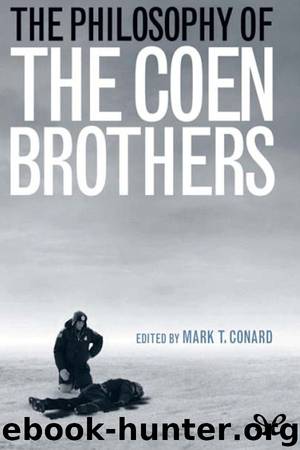The Philosophy of the Coen Brothers by Mark T Conard

Author:Mark T Conard [Conard, Mark T]
Language: eng
Format: epub
Tags: Ensayo, Filosofía, Comunicación, Cine
Publisher: ePubLibre
Published: 2009-01-01T05:00:00+00:00
Set me as a seal upon your heart,
as a seal upon your arm;
for love is strong as death,
passion fierce as the grave.
Its flashes are flashes of fire,
a raging flame.
Many waters cannot quench love,
neither can flood drown it.
If one offered for love
all the wealth of his house,
it would be utterly scorned.
[<<]
[12] Recall The Republic once again, in which Plato makes a classic argument for the importance of character in the formation of moral action. The just man “really sets his own house in good order and rules himself; he arranges himself, becomes his own friend. . . . Then, and only then, he acts, if he does act in some way.” Plato Republic 443d–e. [<<]
[13] Aristotle describes virtues and vices as fixed dispositions or “characteristics” (hexis) that are formed by repeated actions. See Aristotle, Nicomachean Ethics, trans. Martin Ostwald (Upper Saddle River, N.J.: Prentice Hall, 1999), 1103b. While these dispositions do become fixed (e.g., Bernie’s “nature”), Aristotle insists that we are ultimately responsible for them, since we have a free choice about the direction of our character when they first get started. See ibid., 1114b–1115a. [<<]
[14] “Morals excite passions, and produce or prevent actions. Reason of itself is utterly impotent in this particular. The rules of morality, therefore, are not conclusions of our reason.” Hume, Treatise of Human Nature, 457. [<<]
[15] Another reading might suggest that Tom is not actual y moved by Bernie’s appeal at all; instead, he calculates and determines that Bernie will be useful to him down the road—and this does in fact turn out to be the case. But other, intervening events suggest that Bernie’s later role in Tom’s “play” is improvised. The fact that Caspar’s men take him out to Miller’s Crossing to verify the kill, for example, is an eventuality that Tom must have thought possible as he let Bernie go, and yet he did it anyway, endangering himself in the process. It does seem that “sympathy,” in Hume’s classic sense of the term, has in fact been awakened in this scene. In one place in A Treatise of Human Nature, for example, Hume discusses the “vivacity” with which another’s “condition” is presented as central to eliciting sympathetic reaction, and this analysis applies quite precisely to the effectiveness of Bernie’s appeal: “When the present misery of another has any strong influence upon me, the vivacity of the conception is not confin’d merely to its immediate object, but diffuses its influence over all the related ideas, and gives me a lively notion of all the circumstances of that person, whether past, present, or future. . . . By means of this lively notion I am interested 146 Bradley L. Herling in them; take part with them; and feel a sympathetic motion in my breast, conformable to whatever I imagine in his.” Ibid., 386. [<<]
[16] Steven Levy, “Shot by Shot,” in Joel & Ethan Coen: Blood Siblings, ed. Woods, 74. [<<]
[17] The homosexual overtones of the connection between Mink, Bernie, and the Dane are submerged in innuendo
Download
This site does not store any files on its server. We only index and link to content provided by other sites. Please contact the content providers to delete copyright contents if any and email us, we'll remove relevant links or contents immediately.
| Dance | Individual Directors |
| Magic & Illusion | Reference |
| Theater |
Call Me by Your Name by André Aciman(20437)
Ready Player One by Cline Ernest(14586)
How to Be a Bawse: A Guide to Conquering Life by Lilly Singh(7438)
Wiseguy by Nicholas Pileggi(5711)
The Kite Runner by Khaled Hosseini(5134)
On Writing A Memoir of the Craft by Stephen King(4893)
Audition by Ryu Murakami(4891)
The Crown by Robert Lacey(4764)
Call me by your name by Andre Aciman(4648)
Gerald's Game by Stephen King(4612)
Harry Potter and the Cursed Child: The Journey by Harry Potter Theatrical Productions(4468)
Dialogue by Robert McKee(4354)
The Perils of Being Moderately Famous by Soha Ali Khan(4194)
Dynamic Alignment Through Imagery by Eric Franklin(4179)
Apollo 8 by Jeffrey Kluger(3672)
Seriously... I'm Kidding by Ellen DeGeneres(3607)
The Inner Game of Tennis by W. Timothy Gallwey(3604)
How to be Champion: My Autobiography by Sarah Millican(3571)
Darker by E L James(3493)
